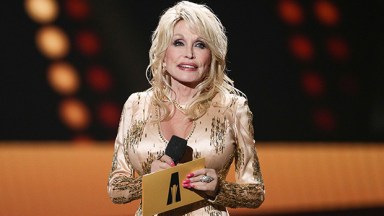
Dolly Parton unfolded a few wretched level in her childhood. Future selling her fresh hold, At the back of the Scenes: My Year in Rhinestones, in an October 9 interview with The Guardian, the 77-year-old clear that her past due grandfather bodily abused her over her style.
“I was willing to pay for it,” Dolly informed the opening. “I’m very sensitive, I didn’t like being disciplined — it hurt my feelings so bad to be scolded or whipped or whatever. But sometimes, there’s just that part of you that’s willing … if you want something bad enough, to go for it.”
Future relating to her music, “The Sacrifice,” Dolly famous that it “kind of sums [her determination] up. It says, ‘I was gonna be rich no matter how much it cost / And I was going to win no matter how much I lost / Down through the years I’ve kept my eye on the prize / And you ask if it’s worth the sacrifice.’ I think it is, for me.”
Dolly’s grandfather — a preacher and a sharecropper — chastised her for dressing just like the “town tramp,” she defined to the opening, referring to a girl of their community who wore prime heels and tight skirts.
“She was flamboyant. She had bright red lipstick, long red fingernails,” the “Jolene” hitmaker mentioned. “She had high-heeled shoes, little floating plastic goldfish in the heels of them, short skirts, low-cut tops, and I just thought she was beautiful. When people would say, ‘She ain’t nothing but trash,’ I would always say, ‘Well, that’s what I’m gonna be when I grow up.’”
In her interview, Dolly identified that even song executives challenged her cloth wardrobe age her recording occupation reached fresh heights.
“I’ve always been true to myself,” the previous Hannah Montana superstar mentioned. “That was what my mama always used to say: ‘To thine own self, be true.’ I put a lot of stock in that. Everything I do, whether it’s my personality, how I conduct myself and business, or whatever, if I do it my way — according to what I understand and believe — there’s a strength in that. You can think, ‘I can stand by this, I can live by this.’”
Despite the fact that Dolly admittedly cared about community’s evaluations, she famous, “I never cared so much that it keeps me from being me.”
Within the early years of her making a song occupation, critics mocked Dolly’s sense of favor. Alternatively, she identified that her glance “came from a very serious place.”
“That’s how I thought I looked best,” she defined. “Sometimes, that’s worked for me; sometimes it can work against you. It took me probably years longer to be taken serious, but I wasn’t willing to change it, and I figured if I had the talent, it’d show up sooner or later [sic].”






